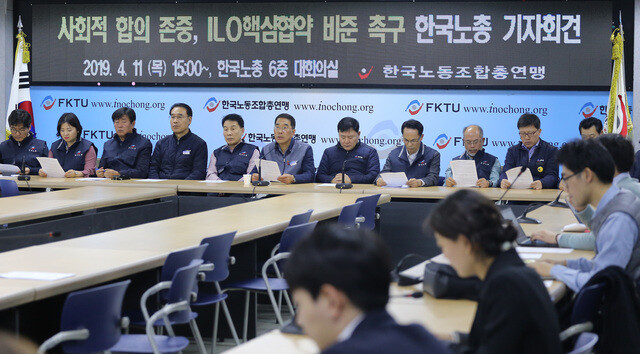hankyoreh
Links to other country sites 다른 나라 사이트 링크
EU may impose sanctions on S. Korea if ILO conventions not ratified, researcher says

The European Union (EU) may impose economic sanctions in accordance with its Free Trade Agreement (FTA) with South Korea over the failure to ratify International Labour Organization (ILO) core conventions, a researcher suggested.
Namgung Joon, an associate research fellow at the Korea Labor Institute (KLI), published an in-depth analysis titled “The Link between International Trade and Labor Standards: Contextualizing the Dispute over South Korea-EU FTA Labor Provisions” in the recently released April edition of the institute’s publication “International Labor Brief.” In the piece, Namgung rejected as “misunderstandings” some of the [South Korean] business community’s arguments regarding the EU’s pressure on South Korea to ratify the core conventions.
Responding to claims that the ratification pressure constitutes an infringement of sovereignty or interference in domestic affairs, Namgung wrote, “Such arguments are contradictory if one considers that the very aim of an FTA is for the signatories to refrain from exercising sovereignty in certain areas in order to obtain greater benefits through mutual market openness.”
Namgung also disputed claims from the business world that EU is not in its power to impose any sanctions for violations of labor-related provisions. Acknowledging that it would “not be possible [for the EU] to impose trade penalties such as the abolition of preferential tariffs,” he added, “It certainly could impose de facto sanctions, such as use as leverage in trade negotiations.” In other words, the EU or its member countries could independently create economic disadvantages for items produced by companies that do not abide by labor standards.
“While the likelihood is not high, a situation of disadvantage could arise depending on whether or not labor rights are respected in areas ranging from traditional trade measures in terms of tariffs and import/export volume restrictions to others concerning taxation, regulation, public procurement, and the corporate subsidy system,” Namgung warned.
Meeting with Minister of Employment and Labor Lee Jae-kap and National Assembly Environment and Labor Committee chair Kim Hack-yong during a visit to South Korea last month, European Commissioner for Trade Cecilia Malmstrom demanded ratification of the ILO core conventions before the summer, warning that the convening of an expert panel as the second stage of dispute resolution procedures would be “unavoidable” without visible progress on the ratification issue in the near future.
Namgung wrote, “Rather than regarding the ILO centennial year of 2019 as a time for taking the risk of testing the efficacy of labor-related provisions, the wiser choice would be to make it the year that [South Korea] fulfilled its long-deferred international responsibility.”
By Jeon Jong-hwi, staff reporter
Please direct comments or questions to [english@hani.co.kr]

Editorial・opinion
![[Column] Life on our Trisolaris [Column] Life on our Trisolaris](https://flexible.img.hani.co.kr/flexible/normal/500/300/imgdb/original/2024/0505/4817148682278544.jpg) [Column] Life on our Trisolaris
[Column] Life on our Trisolaris![[Editorial] Penalties for airing allegations against Korea’s first lady endanger free press [Editorial] Penalties for airing allegations against Korea’s first lady endanger free press](https://flexible.img.hani.co.kr/flexible/normal/500/300/imgdb/original/2024/0502/1817146398095106.jpg) [Editorial] Penalties for airing allegations against Korea’s first lady endanger free press
[Editorial] Penalties for airing allegations against Korea’s first lady endanger free press- [Editorial] Yoon must halt procurement of SM-3 interceptor missiles
- [Guest essay] Maybe Korea’s rapid population decline is an opportunity, not a crisis
- [Column] Can Yoon steer diplomacy with Russia, China back on track?
- [Column] Season 2 of special prosecutor probe may be coming to Korea soon
- [Column] Park Geun-hye déjà vu in Yoon Suk-yeol
- [Editorial] New weight of N. Korea’s nuclear threats makes dialogue all the more urgent
- [Guest essay] The real reason Korea’s new right wants to dub Rhee a founding father
- [Column] ‘Choson’: Is it time we start referring to N. Korea in its own terms?
Most viewed articles
- 1New sex-ed guidelines forbid teaching about homosexuality
- 260% of young Koreans see no need to have kids after marriage
- 3Presidential office warns of veto in response to opposition passing special counsel probe act
- 4[Column] Life on our Trisolaris
- 5Months and months of overdue wages are pushing migrant workers in Korea into debt
- 6OECD upgrades Korea’s growth forecast from 2.2% to 2.6%
- 7S. Korea discusses participation in defense development with AUKUS alliance
- 8[Editorial] Penalties for airing allegations against Korea’s first lady endanger free press
- 9Opposition calling for thorough investigation into Pres. Park’s unelected power broker
- 10Ruling and opposition parties agree to special prosecutor for Pres. Park/Choi Sun-sil scandal